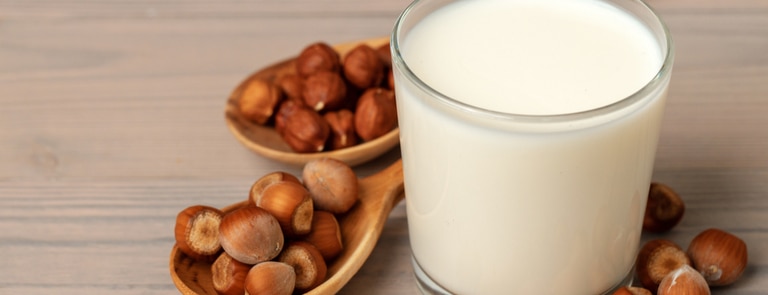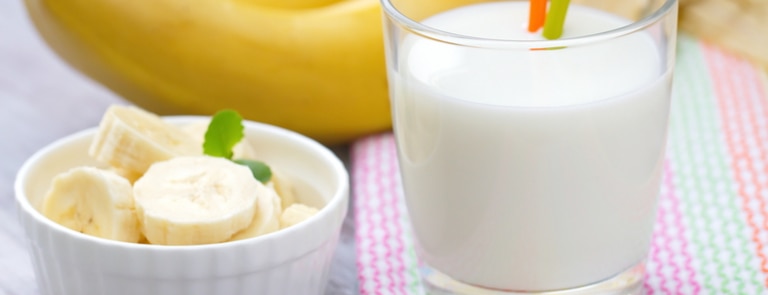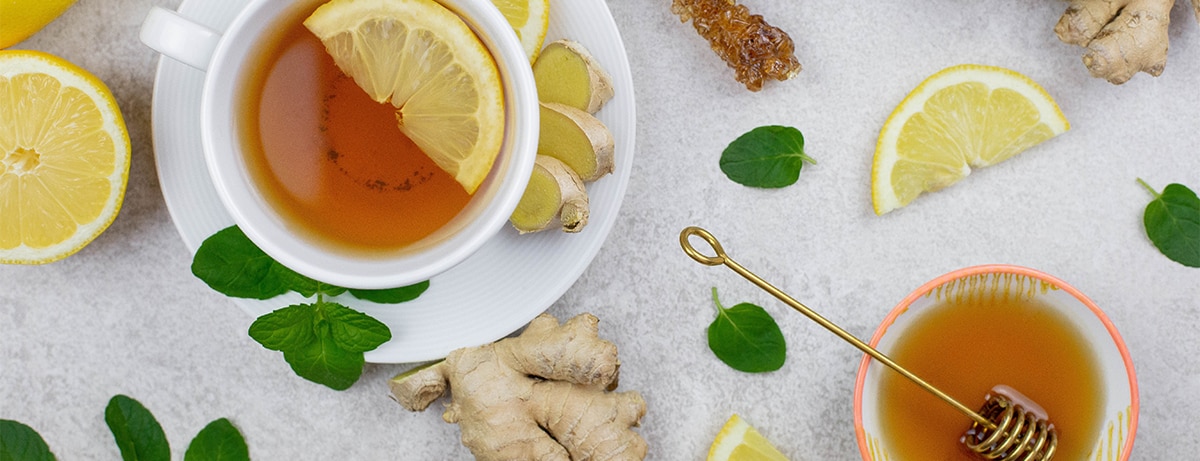15% off €35
15% off €35
Code:GET15

Dairy-free diets are on the rise, and luckily the choice of cow’s milk alternatives is now better than ever.
Whether you’re lactose intolerant, have a dairy allergy, follow a vegan diet or simply want to try the tasty selection of plant-based, and wider, milks on offer, we’ve got you covered.
Read on for the nutrients contained in the various different dairy and non-dairy milks and discover how they could benefit your health.
We’ve also included suggestions on the best way to use some of them too.
What are the four types of milk?
Generally speaking, when it comes to dairy milk the four different types of milk are: whole milk (3.25% milk fat), reduced fat milk (2%), low fat milk (1%) and fat-free milk, which is also known as skimmed milk.1
Each of these four milk types contain nine essential ingredients, as well as protein.
They also contain varying different amounts of milk fat, which is referenced as a percentage on the label.
The different cap colours also illustrate the different milk fat levels - red for whole milk, pink or light blue for skimmed milk, blue tops for 2% milk and green tops for 1% milk.
These milks also contain 8g of protein.
Types of milk vary by percentage of milk fat, or the amount of fat that’s in the milk by weight.
These percentages are noted on the packaging and by the different cap colours, which are designed to show milk fat levels at a glance.
1. Whole milk
As the name suggests, this has the highest milk fat content of all four milks.
There are 150 calories in an 8 ounce glass of whole milk and 8g of fat (12% of daily value).
Alternative dairy milks that contain less or no milk fat, include reduced fat (2% milk), low-fat (1% milk) and fat-free (or skim) milk.
2. Reduced fat milk
Reduced fat milk is also referred to as 2% milk, which means the milk fat is 2% of the total weight of the milk.
Even though this type of milk contains less milk fat, an 8 ounce glass of 2% milk contains 5g of fat and has the same 13 essential nutrients as every other type of milk.
3. Low fat milk
The main difference between low fat milk and whole milk is the amount of fat in each serving.
This is also reflected in the calories too.
Eight ounces of low fat milk contains 2.5g of fat and 100 calories, compared to whole milk, which has 8g of fat and 150 calories.
4. Fat-free or skimmed milk
This type of milk contains less fat – there are 80 calories in an 8 ounce glass of fat-free milk.
Contrary to popular belief, fat free or skimmed milk doesn’t contain less fat because it has had water added to it.
It still contains 13 essential nutrients, which includes 8g of protein, despite there being less milk fat content.
Summary
- The four different types of dairy milk are - whole milk (3.25% milk fat), reduced fat milk (2%), low fat milk (1%) and fat-free milk, which is also known as skimmed milk.
- Each one contains nine essential nutrients, including 8g of high-quality protein.
- Types of milk vary by percentage of milk fat or the amount of fat that is in the milk by weight
16 types of milk
The non-dairy milk market has exploded in recent years, with milk being made from all sorts of alternative food sources that you may not have associated with milk, until now.
Let’s take a look at some of them:
Nut milk
How are nut milks made?
So-called nut ‘milk’ is a dairy substitute that can be made from all sorts of different types of nuts. First of all, the nuts are often toasted after their shells have been removed.
After soaking in water, they are crushed into a paste and blended with water.
The liquid that is strained from this mixture is the nut milk. In some cases, flavouring, thickeners, sugar or salt are added.
Almond milk
With its delicate nutty flavour and a light yet creamy texture, unsweetened almond milk has less calories than skimmed cow’s milk.
However, most almond milk contains less protein than dairy milk.
It also contains vitamin E, which helps to maintain the skin and eyes, as well as supports the immune system.
Most varieties are also fortified with calcium and other nutrients like vitamin D.

1
Its subtle taste can be used in sweet and savoury recipes, and a splash of unsweetened almond milk makes a lovely addition to coffee.
2
Ideal for use in baking, desserts or smoothies, it makes tasty cakes, biscuits, and even, rice pudding.
Cashew milk
You may be used to grabbing a handful of these flavoursome nuts as a snack, but cashew nuts also make a rich alternative to milk.
With a less nutty flavour than other nut milks, it’s made from nuts and is rich in minerals like zinc and selenium, which play important roles in immune system function and reproduction.
On average, 100ml of cashew milk provides almost 1g of protein and around 30 calories.

1
Use it along with whole cashew nuts to add its distinct flavour to curries.
2
Alternatively, pour it over cereal, blend it into shakes and smoothies, or why not use it to make a delicious homemade dairy-free ice cream?
Hazelnut milk
Low in saturated fat, most hazelnut milk drinks are fortified with minerals like calcium for added nutrients.
Hazelnuts are a good source of vitamin E, and research has shown that diets rich in these nuts could help improve cholesterol levels.

1
Hazelnut milk has a strong, distinctive taste that can be enjoyed on its own or as a wonderful addition to hot chocolate or coffee.
2
Great in baking and desserts, use it in place of dairy milk in chocolate cake recipes.
Macadamia nut milk
While it’s not necessarily as common a feature as almond or hazelnut milk on supermarket shelves, macadamia nut milk is still a milk that’s made from nuts.
It’s made by blending macadamia nuts with water and has a rich, smooth texture with an almost fruity flavour.2
Walnut milk
Yes, it is possible to get walnut milk these days too. It tastes nutty and isn’t as mild in the nut-tasting stakes as almond milk is.
However, the walnuts are a good source of plant-based Omega 3.
As with other nut milks, such as almond, hazelnut and pecan milk, it’s also possible to make your own walnut milk at home.3
Peanut milk
We’ve all heard of peanut butter, and now it’s possible to get peanut milk too.
It reportedly tastes similar to almond milk, but with undertones of peanuts, and has a smooth and milky texture.
Whereas some non-dairy milk may seem somewhat watered down, peanut milk is said to be rich and thick.4
Pistachio milk
Pistachio milk has a mild and distinctive pistachio flavour.
It’s both rich and light in consistency, plus it also has a slight green shade to it too, just like pistachios do!
The main pistachio nut flavour can also be enhanced with ingredients, such as vanilla and almond, as well as spices, including cardamom and nutmeg.5
Coconut milk
Often confused with coconut water, which is naturally found inside green coconuts, coconut milk is made from pressed coconut flesh that has been combined with water.
It has a rich, creamy consistency that is similar to whole cow’s milk and a noticeably coconut flavour.
The milk is a good source of several vitamins and minerals including vitamin C, iron and selenium.
Coconut milk is high in calories and saturated fats called medium-chain triglycerides, which research suggests may benefit weight loss and metabolism.

1
Although coconut milk can be used in baking, why not start the day with a hearty bowl of porridge made with coconut milk?
A study of 60 men found that coconut milk porridge lowered ‘bad’ LDL cholesterol whilst raising ‘good’ HDL cholesterol.
2
Of course, coconut milk is also commonly used to thicken up sauces and add a lovely flavour to curries.
Plant milk
There are also a few milks that have been made from plant sources.
Oat milk
Oat milk is an ideal alternative for people with a dairy or nut allergy or who are lactose intolerant.
Oat milk contains less protein than pea or soy milk, but more than other plant-based milk, such as coconut, cashew and rice milk.
Oats are recognised as being a good source of potassium, which helps promote healthy blood pressure levels, and contributes to the absorption of iron, which helps prevent anaemia.
They also contain the soluble fibre, beta glucan, that can help with digestion and cholesterol levels. 6
Handpicked content: Oat milk health benefits
Hemp milk
Hemp milk is recognised as having one of the highest sources of plant-based protein.
Hemp seeds - from which hemp milk is made – are, believe it or not, naturally higher in protein than beef.
They also contain Omega 3 (ALA), Omega 6 (GLA) and magnesium, iron, zinc, vitamin B1 and calcium.
Hemp milk actually happens to contain more calcium than dairy milk, protein, as well as Omegas 3 and 6.7
Sesame milk
Sesame milk has a bit of a toasted, yet slightly nutty flavour, which is ideal for people who are allergic to nuts and don’t want to drink dairy milk.
Sesame milks can be made from white sesame seeds or black sesame seeds.
It’s one of those milks that works well in smoothies, in overnight oats and on your cereal, as well as in lattes.
Nutrition-wise, one cup of sesame milk usually contains around 90 calories, 8g of protein and <1g of fibre.8
Banana milk
Yes, it exists too! Just like peanut milk may sound like more of a dream than a reality, banana milk is a plant-based milk that’s around too.
A cup of fortified banana milk contains around 1g of protein, 1g of fibre, 15% of your RDI for vitamin A, 60% of your RDI for vitamin B12, and 20% of your RDI vitamin D.
Be careful though, while some are sweetened naturally with cinnamon, others are sweetened with added sugar.9

1
In smoothies, cereal, baked goods, and even, coffee, for a banana caffeine hit.
Flaxseed milk
Flaxseed milk is an ideal option for people who are allergic to nuts or who are lactose intolerant.
Some flaxseed milks are unsweetened, while others contain added sugar, which means the calorie count can range from 70 to 120.
Flaxseeds are a natural source of protein and fibre, with one tablespoon of whole flaxseed containing 2g of protein and 3g of fibre.
What’s more, flaxseed tends to be one of those milks that’s fortified with additional vitamins and minerals, such as calcium, vitamin A, vitamin B12 and vitamin D.10
Handpicked content: Benefits of flax seeds
Soy milk
Soya milk is made from soybeans, with many sow milk brands fortifying their milk with vitamins and minerals, such as vitamin D and calcium.
Some people choose soy milk because it has a creamier texture than other plant milks and contains Omega 3, which has antioxidant, anti-inflammatory and cardioprotective properties that supports brain and heart heatlh.
One cup of unsweetened soy milk contains 80 calories, 4g of fat, 3g of carbohydrates, 2g of fibre, 1g of natural sugar and 7g of protein.11
Other non-dairy milk
There are also some other types of milk, which include:
Rice milk
As the name suggests, rice milk is a grain milk that’s made from rice.
You can make it really easily yourself, using brown rice, vanilla extract and an optional sweetener (such as agave) to taste.
It’s recognised as containing the least amount of fat compared to other non-dairy alternatives – 1g of unsaturated fat per cup.
It’s also cholesterol-free too, and is ideal for people who have a dairy, nut or soy allergy. Meanwhile, brown rice is naturally high in all of the B vitamins. 12
Pea milk
Pea milk reportedly tastes the most like cow’s milk than all of the non-dairy milk alternatives.
It’s made from pea protein, and it is fortified with vitamins and minerals.
Because it’s low in sugar, carbs and high in protein, it’s suitable for low-carb enthusiasts and for people with diabetes.
In every 8 ounces of pea milk there’s 70 calories, 0g carbs, 0g fibre, 0g sugar and 8g of protein.13
Handpicked content: What is pea milk?
Quinoa milk
Quinoa is a hearty grain that contains plenty of protein; it actually happens to be a complete protein, which means it contains all nine essential amino acids.
To add to that, it contains fibre and minerals, including magnesium and zinc.
Quinoa contains more fibre than most grains, with quinoa milk containing around 10 to 15g of fibre per 100g.
Meanwhile, one cup of quinoa milk contains around 30% of your magnesium RDI, which can help with calcium absorption.14
Picking the right milk for you
The milk you decide to pour over your cereal every morning or add to your daily tea or coffee or bake with is usually determined by personal preference.
Some people prefer the fuller, creamier flavour of whole milk, while others may be counting their calories and opt for fat-free or skimmed milk instead, or just simply use it because they like the fact it’s not so heavy.
But that’s in relation to dairy milks.
There is, of course, a whole world of rapidly-expanding non-dairy milks that are plant or nut-based.
Again, some people may choose these over dairy because they prefer the way they taste or their consistency.
But for some, it’s a case of not being able to drink dairy milk because they are lactose intolerant.
What is lactose intolerance?
Lactose intolerance is a common digestive problem in which the body is unable to digest lactose, which is a type of sugar that’s mainly present in milk and dairy products.
Eating and drinking milk and dairy products when you are lactose intolerant can lead to:
- Flatulence
- Diarrhoea
- A bloated stomach
- Stomach cramps and pains
- Stomach rumbling
- Feeling sick15
What causes lactose intolerance?
The body usually digests lactose using a substance called lactase.
This breaks down lactose into two sugars - glucose and galactose that can be easily absorbed into the bloodstream.
People with lactose intolerance do not produce enough lactase, so the lactose stays in their digestive system, where it's fermented by bacteria.
This leads to the production of various gases, which cause the symptoms associated with lactose intolerance.
Summary
- Some people may opt for non-dairy milk over dairy milk because they prefer the way it tastes or its consistency
- But for some, it’s a case of not being able to drink dairy milk because they are lactose intolerant
- Lactose intolerance is a common digestive problem in which the body is unable to digest lactose
Takeaway
As well as providing a different flavour in hot drinks, cooking or baking, there are plenty of health reasons to explore the variety of dairy-free milk alternatives, which appear to be growing by the day.
This means there are plenty of different options for you to choose from, plus the fact you can have a go at making most of these non-dairy milks at home.
Keep checking those labels though, because some of them can contain added sugars and not all of them are fortified with the same vitamins and minerals.
However, we’re sure the way the non-dairy milk market has grown – and is continuing to grow – you’re bound to find an alternative that ticks all your boxes.
The advice in this article is for information only and should not replace medical care. Please check with your GP or healthcare professional before trying any supplements, treatments or remedies. Food supplements must not be used as a substitute for a varied and balanced diet and a healthy lifestyle.
Last updated: 29 November 2021
- https://gonnaneedmilk.com/articles/types-of-milk-explained/#:~:text=When%20you%20shop%20in%20the,grams%20of%20high%2Dquality%20protein.
- https://www.masterclass.com/articles/how-to-make-macadamia-nut-milk#homemade-mazadamia-nut-milk-recipe
- https://veganonboard.com/how-to-make-walnut-milk-with-foraged-nuts/#:~:text=Walnut%20milk%20might%20not%20be,of%20plant%2Dbased%20Omega%203.
- https://www.thedailymeal.com/healthy-eating/peanut-milk-vegan
- https://savoryspin.com/pistachio-milk/#:~:text=Creamy%20and%20rich%2C%20this%20plant,end%20of%20a%20long%20day.
- https://www.everydayhealth.com/diet-nutrition/diet/plant-based-milks-expected-make-splash/
- https://www.delicious.com.au/food-files/health/article/hemp-milk-coming-s-you-need-know/O4xUlyLa
- https://www.everydayhealth.com/diet-nutrition/diet/plant-based-milks-expected-make-splash/
- https://www.everydayhealth.com/diet-nutrition/diet/plant-based-milks-expected-make-splash/
- https://www.everydayhealth.com/diet-nutrition/diet/plant-based-milks-expected-make-splash/
- https://www.everydayhealth.com/diet-nutrition/pros-cons-soy-milk/
- https://www.fitday.com/fitness-articles/nutrition/healthy-eating/pros-and-cons-of-rice-milk.html
- https://www.verywellfit.com/pea-milk-nutrition-facts-and-health-benefits-4800859
- http://www.dr-chef.com/blog/quinoa-milk-health-benefits/#:~:text=Quinoa%20milk%20is%20high%20in,%2C%20manganese%2C%20zinc%20and%20phosphorus.
- https://www.nhs.uk/conditions/lactose-intolerance/





